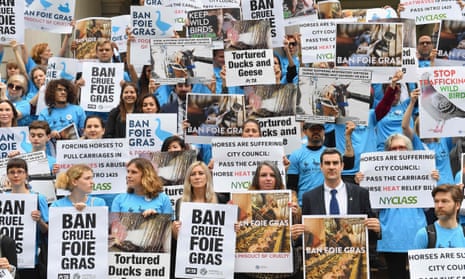Luxury food foie gras could be struck off the menu in New York if proposed legislation to ban the sale of the controversial French delicacy goes ahead.
New York City council is considering outlawing the product – which derives from duck or goose and translates as “fatty liver” – which is a staple at many of its top restaurants.
Critics of foie gras say the process is cruel because ducks and geese are overfed through a pipe which can expand the liver up to 10 times its normal size.
The proposed bill, which could be voted on in months, would ban the sale of foie gras made from birds that have been force fed and establishments from serving it.
Carlina Rivera, the council member who introduced the bill, said the production process is “egregiously cruel”.
She added: “Not only does force feeding cause extreme pain and suffering, it is all being done for a luxury product that only a tiny percentage of New York City restaurants serve and is not part of the diet of hardworking New Yorkers.”
If it passes, anyone violating the law could be liable to a $1,000 fine, up to a year in jail or both.
So far, it has attracted the support of mayor Bill de Blasio and over half the council as co-sponsors.
But not everybody is so enthusiastic.
Marcus Henley, manager of Hudson Valley Foie Gras in Ferndale, New York, one of three foie gras farms in the country and one of two in the state, said the basis for the ban is wrong. The foie gras farming process, he claims, is “verifiably not harmful to animals”.
While a ban would not prevent the farm from rearing ducks for foie gras, it would stop them from selling to New York City, their largest market, and he said it would probably put them out of business.
“This law would potentially devastate a rural, relatively poor community where there are 400 workers that are employed directly and hundreds more indirectly by the foie gras farming companies in upstate New York,” he said.
Among the New York restaurants that serve foie gras is Michelin-starred French restaurant Le Coucou, whose dishes include foie gras with fresh cherries, almonds and girolle mushrooms.
Chef and partner Daniel Rose said although he is in favor of stricter guidelines for overall food production, more consideration is needed before issuing an outright ban on a single product.
He said he would like to see the introduction a series of “non-negotiable” ethical guidelines for food production.
“Can we say that feeding kids high fructose corn syrup causes ‘less suffering’ than the production of foie gras?” he added.
“I don’t know, but I don’t think we have asked all of the meaningful questions and considered enough opinions to start banning individual food items without core principals and processes guiding our decisions … If banning foie gras in New York generates a conversation about the state of food in America and the treatment of animals in general then I’m all for it.”
If New York introduces a ban it will put the city alongside California, which has a state-wide ban on the production and sale of foie gras. Chicago passed a ban in 2006, but it was overturned two years later.
Whole Foods banned its sale in 1997 and Postmates ended deliveries of it last year.
Outside the US, Britain, Israel and India all have bans on sale or production.
Gene Baur, vegan activist and author and president of Farm Sanctuary, hopes New York and California can help spur a world-wide movement.
“Those are two very important markets that will hopefully set a tone for other states and cities and ideally even influence what happens around the world,” he said.
